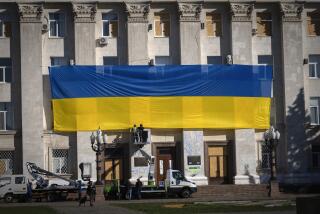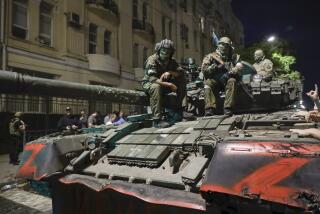Behind the Story : The Will to Fight Russia : A powerful, deeply felt nationalism and more than a century of persecution by Moscow have made Chechens unlikely to surrender.
- Share via
VEDENO, Russia — In Chechnya, the most beloved heroes are tragic.
Perhaps the most honored Chechen of all time was a one-eyed, one-armed, one-legged warrior named Baisamgur of Benoy. The story of Baisamgur, whose name Chechens mention frequently these days, helps explain why Chechnya’s Muslim fighters have not surrendered despite a four-month pounding by the mighty Russian army.
In 1859, during the final battle of Russia’s 40-year war to conquer the defiant Caucasus region, the czar’s armies besieged a fort in Dagestan where the last Chechen fighters were barricaded. Baisamgur urged his old friend Shamil, an ethnic Avars who had become the leader of the Chechens, to never surrender.
But hopelessly outnumbered and outgunned, Shamil did surrender. As he rode out of the fortress a Russian prisoner, legend has it that Baisamgur twice called out, “Shamil!” But the proud general never looked back.
Later, Shamil explained that it is a great sin among Chechens to shoot one’s enemy in the back; had he turned to face his friend and say good-bye, he knew Baisamgur would have shot him for treachery.
Today, the Chechen rebels have once again been driven from the ravaged plains at the foot of the Caucasus Mountains, and once again they have retreated to the craggy hills southeast of Grozny, where they have pitched a symbolic headquarters in Vedeno inside a fortress built by Shamil himself. (The real military command is being moved to a secret location in the mountains to escape Russian bombing.)
Chechen commanders insist that rebel President Dzhokar M. Dudayev is still running the war, despite indications that the former Soviet general has lost popularity among the fighters.
Some Chechens are disgusted with Dudayev for failing to strike a deal with Moscow that would have avoided the war entirely. Others fault him for swearing that he had amassed a huge arsenal of sophisticated weaponry, in particular the anti-aircraft missiles that were nowhere to be seen when Russia began punishing air attacks on Chechnya.
“Dudayev kept saying he had (U.S.-made) Stinger missiles he had bought from the Afghan rebels, and it turns out there weren’t any,” said Mayerbek Vachagayev, a Moscow-based student of Chechen history. “He was a symbol of Chechen independence, but now he’s seen as the reason Chechnya lost the war. Now some people say that Dudayev was an agent (of the former KGB).”
However weak Dudayev’s position, fighters say the Chechen president would never dare surrender or attempt to flee into exile, because he knows that the Baisamgurs of today would kill him for such cowardice--or worse, revenge themselves upon Dudayev’s family.
When Russian President Boris N. Yeltsin decided that only overwhelming military force could squelch Dudayev’s self-declared independence, experts on the volatile Caucasus warned that Yeltsin was picking a fight that would quickly become a generational blood feud.
To Moscow, the Dudayev regime was an outlaw’s paradise that became a safe haven for arms trafficking, bank fraud, hijacking, smuggling and train robbery. Many Chechens agreed--and say they would not have minded a quick Russian-backed putsch.
But the indiscriminate bombing and shelling of civilians was interpreted by the Chechen public as proof of Moscow’s age-old intent to exterminate them. They surprised the world with the strength of their resistance.
Now, as the conflict in Chechnya shows signs of becoming a chronic, guerrilla war against Russian occupation, the Kremlin appears still to be underestimating the power of the Chechens’ ideology.
The Chechens’ history of persecution has bred a nationalist mythology that helps explain why the rebels are unlikely to abandon even an utterly hopeless quest for independence.
“You proceed from the Western mentality that, if you’re outnumbered and you’re going to lose anyway, why fight? We don’t think this way,” said Movladi Udugov, Dudayev’s minister of information.
“It is my deep conviction that Russia is doomed,” he said.
From their mountain redoubt in Vedeno, Udugov and other rebels view the Russian Federation as an anemic, corrupt and amoral heir to the empire built by the czars and commissars after the merciless suppression of their non-Russian subjects. Like other such empires, Russia will eventually crumble, many Chechens believe.
“Russia has no future,” Udugov said. “The whole world, including the U.S., is working to bring about Russia’s destruction. So we think that Russia will collapse before it succeeds in defeating Chechnya.”
As the Chechens’ main propagandist, Udugov has spent much of the war trying fruitlessly to drum up support for his cause among Chechnya’s Muslim neighbors and in the West. Both the Russians and the Chechens have taken to quoting American history to justify their positions. Russian Foreign Minister Andrei V. Kozyrev has compared Yeltsin to Abraham Lincoln in his willingness to go to war rather than allow a secessionist state to shatter the union. Udugov prefers to compare the Chechens to the rebellious American colonists.
In fact, the Chechens’ history is closer to that of the native Americans. For centuries, they staved off foreign invaders from Genghis Khan to Tamerlane by fighting fiercely on the plains and then up in the mountains, where attackers decided it was not worth pursuing them.
Russian Gen. Alexei P. Yermolov finally conquered Chechnya in 1859 by burning the Chechens’ harvests, torching their villages and chopping down the thick forests where fighters hid. Five thousand Chechen families were sent into exile in Turkey and Jordan. By the 1868 census, the Chechen population had dropped by more than half, to 98,000.
In the 1920s, the Bolsheviks rounded up and imprisoned or shot thousands of Chechen intellectuals, Islamic leaders and anyone else deemed capable of inspiring a nationalist challenge to Communist rule. Then, in 1944, dictator Josef Stalin deported about 400,000 Chechens to desolate Kazakhstan; after Stalin’s death about half of them returned.
As fighters, the Chechens have certainly proved their mettle. They inflicted heavy casualties on the Russian forces advancing on Grozny last December and fought fiercely against overwhelming odds on the plains of Chechnya all winter. Last weekend, up to 1,000 Chechen fighters reportedly prepared for what appeared to be a suicidal last stand at a former Russian army base in the southeastern town of Bamut by barricading themselves inside fortifications designed to withstand nuclear attack.
“We have 300 years’ experience in fighting Russia,” Udugov boasted. “The whole world is afraid of the Russians. But the Chechens have been fighting against a nuclear power for four or five months now. . . .
“Russian forces proclaim, ‘We have captured Shali,’ giving the impression that they have conquered Berlin, or Paris, or London,” Udugov added contemptuously. “Shali has a population of 20,000 or 25,000. It’s a village!”
From Dudayev to the angry women who try to make sense of their fate as they comb through the bombed out rubble of their home, the Chechens are unreconstructed Cold Warriors.
They adore Ronald Reagan for declaring their old nemesis an “evil empire.” They think Bill Clinton is a wimp. They say the West is being hoodwinked if it thinks Russia has mended its expansionist and brutal Soviet ways.
“Don’t believe the Russians. They are no democrats,” whispered Chechen Col. Iles Arsanokayev from his bed in Vedeno Hospital, where he had just had a leg amputated at the knee. “The whole world used to say, ‘Better dead than Red.’ Well, Chechens have shown the world how to fight for freedom.”
Arsanokayev added that, as soon as his stump heals, he intends to go back and fight more Russians--to the death.
More on Chechens
* If history is any guide, Moscow’s problems with the proud, embittered and vengeful Chechen people are far from over. Reprints of “Kremlin Has Hands Full With Chechens” are available from Times on Demand. Call 808-8463, press *8630 and select option 1. Order No. 6046. $2.
Details on Times electronic services, B4
More to Read
Sign up for Essential California
The most important California stories and recommendations in your inbox every morning.
You may occasionally receive promotional content from the Los Angeles Times.













